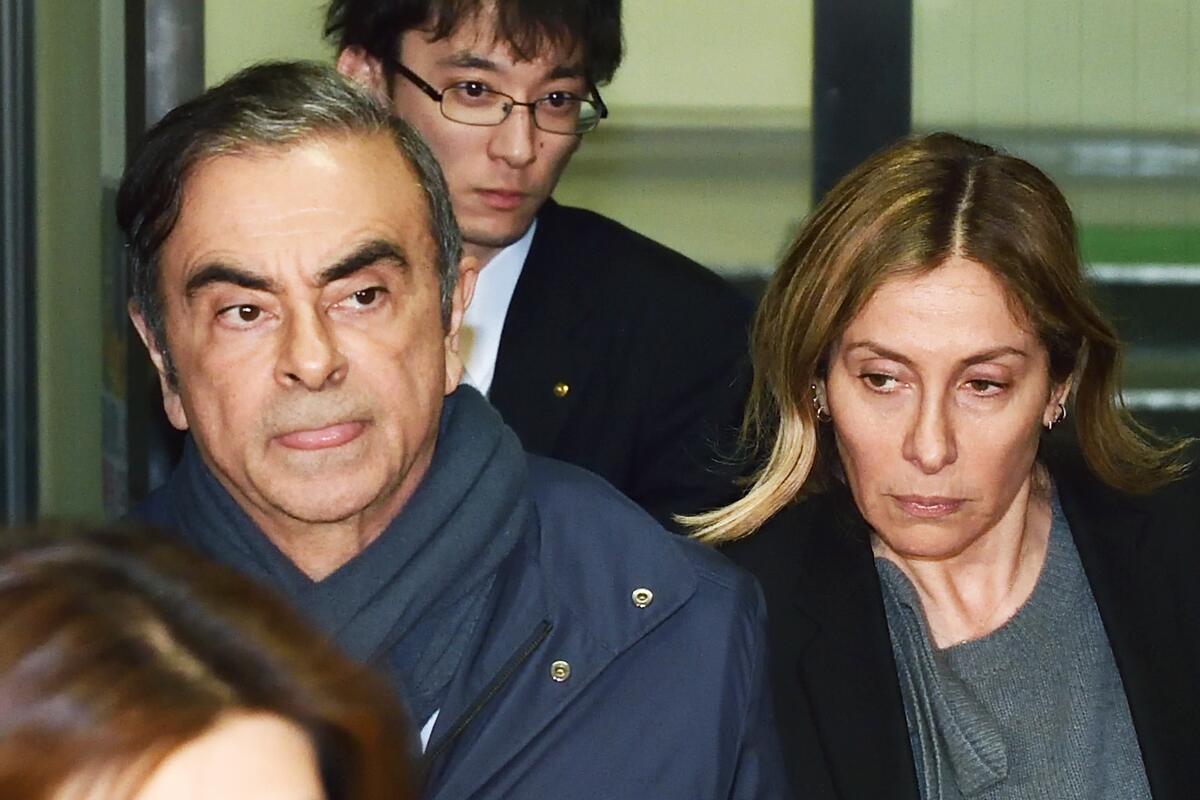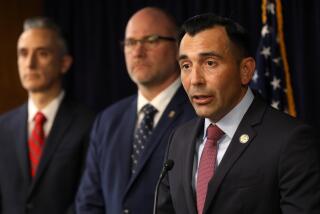Japan issues arrest warrant for Carlos Ghosn’s wife

- Share via
TOKYO — Tokyo prosecutors obtained an arrest warrant Tuesday for the wife of Nissan’s former chairman, Carlos Ghosn, on suspicion of perjury, adding to the couple’s legal troubles in the country where he once was revered as a star executive.
The move against Carole Ghosn, who is not in Japan, followed her husband’s flight to Lebanon last week while he was out on bail awaiting trial for alleged financial misconduct.
Prosecutors said in a statement that Carole Ghosn gave false testimony to a Tokyo court last year in her husband’s case about the transfer of money from one company to another that allegedly caused losses to Nissan.
She also falsely denied knowing various people, or meeting with them, they said. The allegations cited were unrelated to Ghosn’s escape.
Carole Ghosn was not immediately available for comment, but earlier she told the Associated Press after her questioning in court that she considered the questions trite and unsubstantial.
She was banned from meeting with her husband after his release on bail because of fears she might help tamper with evidence.
Lebanon and Japan do not have an extradition treaty. Japanese justice officials acknowledge that it’s unclear whether Carlos, and now Carole, who has been seen in photos released by his lawyer with him in Beirut, can be brought back to Japan to face any of the charges. They said they were still looking into what could be done.
Prosecutors have said they did not want Carlos Ghosn to be granted bail because they saw him as a flight risk.
“With his abundant financial power and multiple foreign bases worldwide, it would be easy for the defendant Ghosn to flee from Japan,” they said in a statement.
Earlier Tuesday, Ghosn’s former employer, Nissan Motor Co., said it was still pursuing legal action against him despite his escape from Japan to Lebanon.
The Japanese automaker said in a statement that Ghosn engaged in serious misconduct while leading the Nissan-Renault-Mitsubishi alliance.
“The company will continue to take appropriate legal action to hold Ghosn accountable for the harm that his misconduct has caused to Nissan,” it said without giving details.
Japan’s chief government spokesman told reporters that Tokyo has told Lebanon that Ghosn left the country illegally and was seeking cooperation in finding out what happened. Chief Cabinet Secretary Yoshihide Suga said the situation had to be handled carefully.
The Foreign Ministry said the Japan’s ambassador to Beirut planned to meet with Lebanese President Michel Aoun later in the day.
Ghosn managed to skip bail and leave the country despite surveillance while he was staying at a home in Tokyo.
Japanese news reports Tuesday gave new details of that escape, saying he left his residence alone, met two men at a Tokyo hotel, and then took a bullet train to Osaka before boarding a private jet hidden inside a case for musical equipment.
Japanese Justice Minister Masako Mori told reporters that measures were being taken to make sure all cargo and luggage get inspected at regional airports, including those for private jets, to prevent a recurrence.
Japanese major business daily Nikkei reported, without citing sources, that dozens of people in various countries helped to plan his clandestine departure.
Nissan’s statement was the first word from the company since Ghosn’s flight last week. The automaker and Japanese prosecutors allege Ghosn misstated his future compensation and diverted company assets for personal gain. He says he is innocent.
Ghosn has not appeared in public since arriving in Lebanon. He is expected to give his side of the story in a news conference planned for Wednesday in Beirut.
Earlier, he said the allegations against him were concocted by Nissan, Japanese authorities and others who wanted to block efforts toward a fuller merger between Nissan and its French alliance partner Renault SA.
Ghosn said in a statement last week that he wanted to escape “injustice.” Critics of the Japanese judicial system say his case exemplifies its tendency to move too slowly and keep suspects in detention for too long.
Nissan said in its statement that an investigation is ongoing in France, and the U.S. Securities and Exchange Commission has found some wrongdoing.
Ghosn has not been charged in France or the U.S.
Mori and other Japanese officials have defended the nation’s judicial system and denounced Ghosn’s escape as an “unjustifiable” crime. Mori said each nation’s system has its own way of making arrests and granting bail.
The scandal over Ghosn’s case has tarnished Nissan’s image and created a leadership vacuum at a time when the automaker’s profits and sales are tumbling. Ghosn’s successor Hiroto Saikawa also resigned last year amid financial misconduct allegations related to questionable income.
“Nissan will continue to do the right thing by cooperating with judicial and regulatory authorities wherever necessary,” the Yokohama-based company said.
Although Ghosn is unlikely to face trial in Japan, Greg Kelly, another Nissan former executive, is still facing charges of under-reporting Ghosn’s future compensation. He says he is innocent.
Kelly, an American, who is out on bail, has not been charged with the breach of trust allegations Ghosn is also facing.
Nissan has also been charged as a corporate entity. The company says it won’t fight the charges and will pay the required fines.
More to Read
Sign up for Essential California
The most important California stories and recommendations in your inbox every morning.
You may occasionally receive promotional content from the Los Angeles Times.










